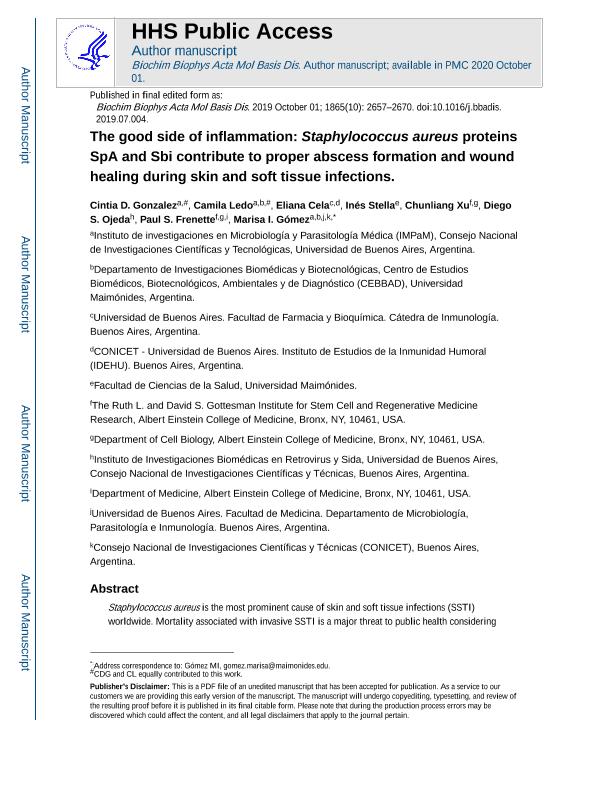Mostrar el registro sencillo del ítem
dc.contributor.author
Gonzalez, Cintia Daniela

dc.contributor.author
Ledo, Camila

dc.contributor.author
Cela, Eliana Maiten

dc.contributor.author
Stella, Inés
dc.contributor.author
Xu, Chunliang
dc.contributor.author
Ojeda, Diego Sebastian

dc.contributor.author
Frenette, Paul S.
dc.contributor.author
Gómez, Marisa Ileana

dc.date.available
2021-05-27T15:37:53Z
dc.date.issued
2019-10
dc.identifier.citation
Gonzalez, Cintia Daniela; Ledo, Camila; Cela, Eliana Maiten; Stella, Inés; Xu, Chunliang; et al.; The good side of inflammation: Staphylococcus aureus proteins SpA and Sbi contribute to proper abscess formation and wound healing during skin and soft tissue infections; Elsevier Science; Biochimica et Biophysica Acta - Molecular Basis of Disease; 1865; 10; 10-2019; 2657-2670
dc.identifier.issn
0925-4439
dc.identifier.uri
http://hdl.handle.net/11336/132661
dc.description.abstract
Staphylococcus aureus is the most prominent cause of skin and soft tissue infections (SSTI) worldwide. Mortality associated with invasive SSTI is a major threat to public health considering the incidence of antibiotic resistant isolates in particular methicillin resistant S. aureus both in the hospital (HA-MRSA) and in the community (CA-MRSA). To overcome the increasing difficulties in the clinical management of SSTI due to MRSA, new prophylactic and therapeutic approaches are urgently needed and a preventive vaccine would be welcome. The rational design of an anti-S. aureus vaccine requires a deep knowledge of the role that the different bacterial virulence factors play according to the type of infection. In the present study, using a set of isogenic deficient mutants and their complemented strains we determined that the staphylococcal surface proteins SpA and Sbi play an important role in the induction of inflammatory cytokines and chemokines in the skin during SSTI. SpA and Sbi initiate signaling cascades that lead to the early recruitment of neutrophils, modulate their lifespan in the skin milieu and contribute to proper abscess formation and bacterial eradication. Moreover, the expression of SpA and Sbi appear critical for skin repair and wound healing. Thus, these results indicate that SpA and Sbi can promote immune responses in the skin that are beneficial for the host and therefore, should not be neutralized with vaccine formulations designed to prevent SSTI.
dc.format
application/pdf
dc.language.iso
eng
dc.publisher
Elsevier Science

dc.rights
info:eu-repo/semantics/openAccess
dc.rights.uri
https://creativecommons.org/licenses/by-nc-sa/2.5/ar/
dc.subject
ABSCESS
dc.subject
SBI
dc.subject
SKIN INFECTIONS
dc.subject
SPA
dc.subject
STAPHYLOCOCCUS AUREUS
dc.subject.classification
Enfermedades Infecciosas

dc.subject.classification
Ciencias de la Salud

dc.subject.classification
CIENCIAS MÉDICAS Y DE LA SALUD

dc.title
The good side of inflammation: Staphylococcus aureus proteins SpA and Sbi contribute to proper abscess formation and wound healing during skin and soft tissue infections
dc.type
info:eu-repo/semantics/article
dc.type
info:ar-repo/semantics/artículo
dc.type
info:eu-repo/semantics/publishedVersion
dc.date.updated
2020-11-18T17:31:38Z
dc.journal.volume
1865
dc.journal.number
10
dc.journal.pagination
2657-2670
dc.journal.pais
Países Bajos

dc.journal.ciudad
Amsterdam
dc.description.fil
Fil: Gonzalez, Cintia Daniela. Consejo Nacional de Investigaciones Científicas y Técnicas. Oficina de Coordinación Administrativa Houssay. Instituto de Investigaciones en Microbiología y Parasitología Médica. Universidad de Buenos Aires. Facultad de Medicina. Instituto de Investigaciones en Microbiología y Parasitología Médica; Argentina
dc.description.fil
Fil: Ledo, Camila. Consejo Nacional de Investigaciones Científicas y Técnicas. Oficina de Coordinación Administrativa Houssay. Instituto de Investigaciones en Microbiología y Parasitología Médica. Universidad de Buenos Aires. Facultad de Medicina. Instituto de Investigaciones en Microbiología y Parasitología Médica; Argentina. Universidad Maimónides. Área de Investigaciones Biomédicas y Biotecnológicas. Centro de Estudios Biomédicos, Biotecnológicos, Ambientales y de Diagnóstico; Argentina
dc.description.fil
Fil: Cela, Eliana Maiten. Consejo Nacional de Investigaciones Científicas y Técnicas. Oficina de Coordinación Administrativa Houssay. Instituto de Estudios de la Inmunidad Humoral Prof. Ricardo A. Margni. Universidad de Buenos Aires. Facultad de Farmacia y Bioquímica. Instituto de Estudios de la Inmunidad Humoral Prof. Ricardo A. Margni; Argentina
dc.description.fil
Fil: Stella, Inés. Universidad Maimónides; Argentina
dc.description.fil
Fil: Xu, Chunliang. Albert Einstein College of Medicine; Estados Unidos
dc.description.fil
Fil: Ojeda, Diego Sebastian. Consejo Nacional de Investigaciones Científicas y Técnicas. Oficina de Coordinación Administrativa Houssay. Instituto de Investigaciones Biomédicas en Retrovirus y Sida. Universidad de Buenos Aires. Facultad de Medicina. Instituto de Investigaciones Biomédicas en Retrovirus y Sida; Argentina
dc.description.fil
Fil: Frenette, Paul S.. Albert Einstein College of Medicine; Estados Unidos
dc.description.fil
Fil: Gómez, Marisa Ileana. Consejo Nacional de Investigaciones Científicas y Técnicas. Oficina de Coordinación Administrativa Houssay. Instituto de Investigaciones en Microbiología y Parasitología Médica. Universidad de Buenos Aires. Facultad de Medicina. Instituto de Investigaciones en Microbiología y Parasitología Médica; Argentina. Universidad Maimónides. Área de Investigaciones Biomédicas y Biotecnológicas. Centro de Estudios Biomédicos, Biotecnológicos, Ambientales y de Diagnóstico; Argentina
dc.journal.title
Biochimica et Biophysica Acta - Molecular Basis of Disease

dc.relation.alternativeid
info:eu-repo/semantics/altIdentifier/url/https://linkinghub.elsevier.com/retrieve/pii/S0925443919302273
dc.relation.alternativeid
info:eu-repo/semantics/altIdentifier/doi/http://dx.doi.org/10.1016/j.bbadis.2019.07.004
Archivos asociados
